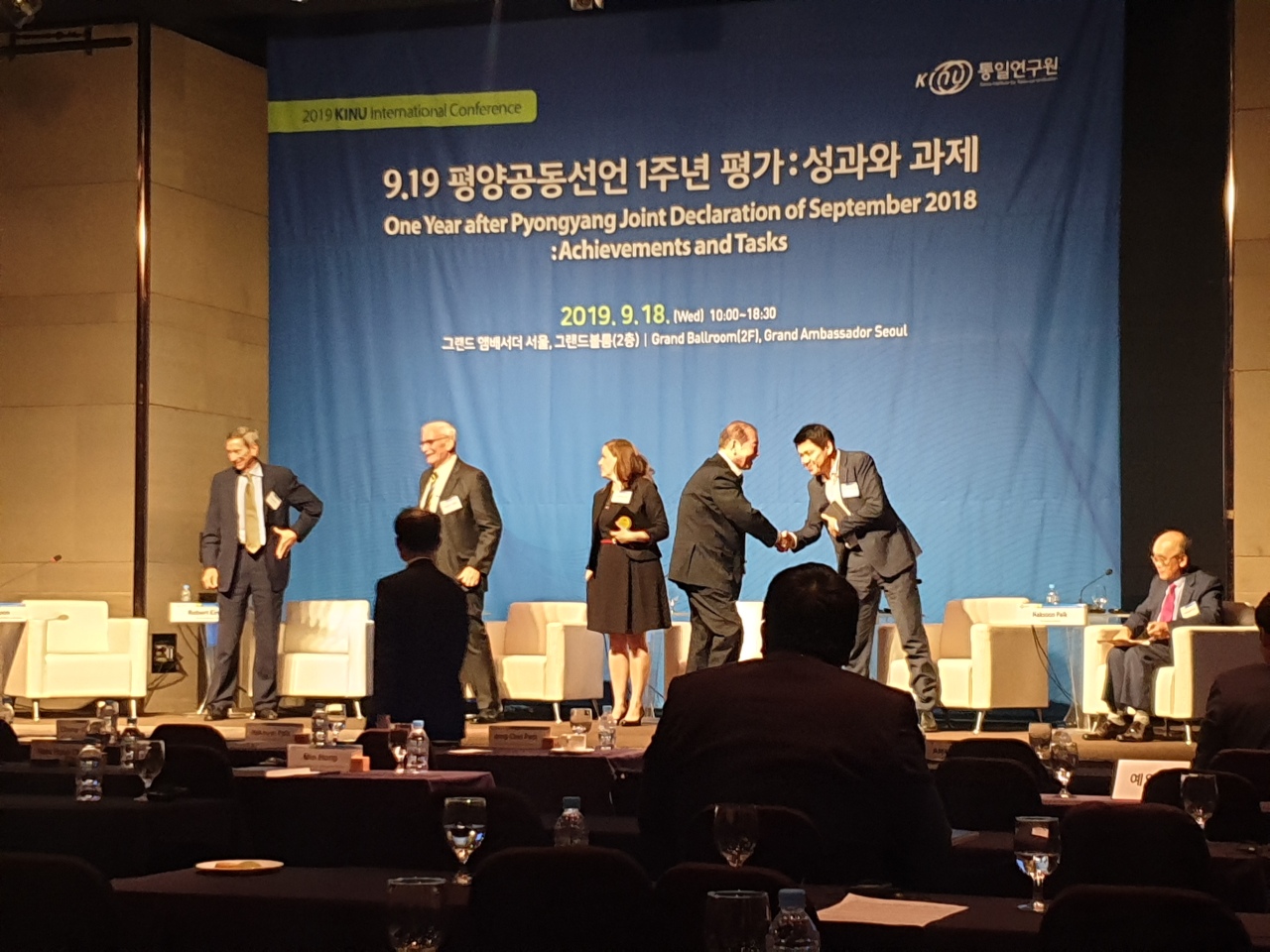The United States and North Korea could take compromise approaches to get tangible results in the next round of denuclearization negotiations, experts said during an international conference hosted by Korea Institute for National Unification, a state-funded think tank, Wednesday.
Robert Einhorn, a senior fellow at the Brookings Institute, suggested a near-term arrangement between Washington and Pyongyang to move their stalled talks forward by addressing the North’s nuclear and missile capabilities but not chemical and biological weapons.
 |
Korea Institute for National Unification hosted a conference, titled “One Year After Pyongyang Joint Declaration of September 2018: Achievements and Tasks,” on Wednesday at the Grand Ambassador Seoul. |
“To overcome the current impasse and get negotiations on track, it will therefore be necessary to adopt an approach to the negotiations that involves agreeing on some version of a freeze in the near term while deferring the task of reaching agreement on the timing and modalities of achieving complete denuclearization,” Einhorn said.
The conference, titled “One Year After Pyongyang Joint Declaration of September 2018: Achievements and Tasks,” was held as the US and North Korea were expected to hold working-level talks in late September after months of a deadlock since the second North Korea-US summit, held in Hanoi in February, ended without a deal.
Washington and Pyongyang remain far apart in their approaches to denuclearization. Washington wants North Korea to relinquish all of its weapons of mass destruction first. Pyongyang, on the other hand, says it is willing to give up nuclear weapons in a phased manner in exchange for partial sanctions relief and security assurances.
Cho Nam-hoon, senior research fellow at Korea Institute for Defense Analyses, also proposed compromise.
“At this moment, the demands of North Korea and the US are in sharp conflict and the prospects for an agreement remain dim,” he said.
As the possibility of denuclearization under “complete, verifiable, irreversible dismantling” is decreasing, he said the two countries could comprehensively set forth all denuclearization measures and corresponding measures and then arrange them into multiple packages for a phased implementation.
At the conference marking the first anniversary of the landmark Pyongyang Declaration, experts also discussed Inter-Korean relations that have been stalled since early this year after a major breakthrough was seen following North Korea’s participation in the 2018 Winter Olympics in PyeongChang, Gangwon Province.
Some analysts believe the North started to give the South the cold shoulder due to dissatisfaction with Seoul’s passive attitude, especially after the Hanoi summit.
Moon Jang-nyeol, a member of the Presidential Commission on Policy Planning, pointed out that little has been achieved in terms of the substantive elimination of the risk of war, inter-Korean exchanges and the implementation of denuclearization since the Pyongyang Declaration was signed.
“As the denuclearization talks between North Korea and the US have reached a deadlock, the environment is yet not ripe for the implementation of the inter-Korean agreement,” Moon said.
While supporting Pyongyang and Washington for taking leading roles in the denuclearization talks, Seoul needs to demonstrate to the North that it will speak out to the US on issues regarding the security guarantee for the North and the easing of sanctions imposed against the regime, he said.
(
hnpark@heraldcorp.com)








![[Today’s K-pop] Blackpink’s Jennie, Lisa invited to Coachella as solo acts](http://res.heraldm.com/phpwas/restmb_idxmake.php?idx=644&simg=/content/image/2024/11/21/20241121050099_0.jpg)